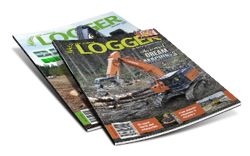IT COULD DEVELOP INTO ONE ANSWER to control wilding conifer as well as producing wood chip for a variety of uses. At least this would be the long-term aim of Brad Coleman and his chipping team if the current trials are successful.
The owner of Canterbury Woodchip Supplies, Brad has been in the woodchip business for more than a decade and lately invested in a 50/48 Morbark chipper, capable of producing up to 80 tonnes of chip per hour.
In mid-November 2020, the 865 hp machine demonstrated its capabilities on a four-hectare stand consisting of mixed age (15 – 25 years) Pinus Contorta, near the Meridian canal at Lake Pukaki. This combination of excavator/chipper is manoeuvred along the site, with the chipper being remotely controlled by the excavator operator.
It took 12 hours to process the four hectares (under two days including stoppages) says company Sales Manager Sam Lees, which indicates the extent of areas that could be cleared over a 12-month period. Speaking at a chipping demonstration, he says at this stage the chipped material is evenly spread back over the area in order to create a mulch blanket for an alternative land use.
The most significant point of difference with this method of site clearance is that it can be applied to either cutover forest or standing trees. It makes little difference with this size machine, due to its enormous capacity to process butts up to 1200mm in diameter.
Brad explains: “We are working towards proposing a safe, fast and efficient felling methodology to the National Wilding Conifer programme. The key benefit of this approach is the reinstatement of bare land, which in turn provides multiple future options for the land in question”.
In order to further improve efficiency, the leading question is: Could the chipped material be sold into the marketplace to be used as boiler fuel or animal bedding?
“We wholeheartedly believe some parts of the wilding conifer estate should be used to create biomass wood fuel,” says Brad. “The challenge with this location is there are no large-scale end users within a reasonable radius of the Mackenzie Basin.”
Queenstown based Sir John Davies, owner of the Hermitage Hotel at Mount Cook, has shown interest in establishing a chip boiler but was concerned about a consistent supply from local forests and consents required on Department of Conservation land.
Whole-tree approach
Based on the current trials, Brad estimates
a cost range between $2,000 and $3,000
per hectare subject to the stocking rate.
This needs to be compared with other
Wilding clearance methods, such as aerial
spray on full canopy forest, ground-based
machine clearance and manual labour.
Pukaki Downs Station achieved some clearance by bulldozing trees into heaps.
Station Manager, George Ormand, also attended the chipping demonstration with his forest manager, Rupert Price.
In spite of the recent fires there are still several thousand hectares of standing trees on both sides of the Pukaki and Ohau lakes. Canterbury Woodchip strongly believes a significant...





